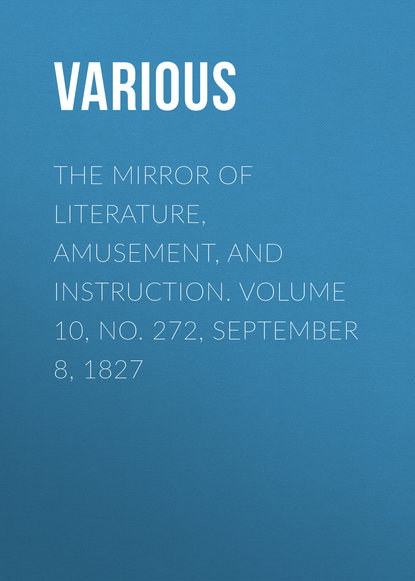По всем вопросам обращайтесь на: info@litportal.ru
(©) 2003-2024.
✖
The Mirror of Literature, Amusement, and Instruction. Volume 10, No. 272, September 8, 1827
Автор
Год написания книги
2018
Настройки чтения
Размер шрифта
Высота строк
Поля
MENTAL DERANGEMENT
The term melancholia is applied to insanity, when attended with depression of spirits, arising commonly from some supposed impending evil; but sometimes it takes place without any such error of judgment, and is altogether unaccountable. As far as I have seen, this depression of spirits is in no wise essentially connected with, far less dependent upon, bodily weakness, as its cause. On the contrary, you will often find such patients to be of full habit, and complaining of throbbing headach, with flushing of the face, a full and strong pulse, though sometimes the pulse is preternaturally slow; the tongue is often white and dry, as in inflammation in general. These symptoms, considered in themselves, would call for antiphlogistic measures, such as bleeding and purging; and these are not at all the less necessary because the patient is in a low and desponding state of mind. In short, I know of no difference in the medical treatment of mania and melancholia, merely as such; you must look to the state of vascular action, both local and general, in order to lay down a proper plan of cure.
Hypochondriasis is a still slighter form of mental derangement, and which is characterized by a preposterous anxiety and solicitude with regard to the patient's own health, which in these cases is often little if at all disturbed, with the exception of occasional uneasiness at the stomach, arising from flatulency and other effects of indigestion. This disorder in the state of the digestive function, is generally considered by the patient as the real and primary disease, though 99 times in 100 it is merely secondary, the result of torpor of the alimentary canal altogether. This torpor is the consequence of an oppressed condition of brain, proceeding, for the most part, from increased arterial action in this organ. Thus the effect is taken for the cause, and a treatment directed in conformity with this mistaken notion. Happily, the practice usually pursued on those occasions, and which is directed to the state of the stomach and intestinal canal, is, as far as it goes, beneficial to the primary disease; for occasional purging, whether with the blue pill or Plummer's pill, and the use of a simple and abstemious mode of living, are as well calculated to relieve affections of the brain, as those of the stomach. But the fault of such a mistaken view of the subject is, that the treatment is confined too exclusively to one organ, and that the one not primarily affected; to the neglect of other means that may be as much or more required for the relief of the head. Where, for example, the patient complains of throbbing headach, with other marks of increased arterial action in and about the brain, it is dangerous to rely solely upon cathartics, and to neglect bleeding, a neglect, which, I have more than once seen reason to believe, has been the occasion of fatal apoplexy ensuing.
The precise difference in the condition of the brain, in the three forms of insanity now mentioned, is not at all known. Dissection hitherto has not thrown any light upon the subject; nor is it probable that it will do so hereafter. The derangement of intellect in all of them, and the mutual convertibility of one into the other, prove that there is no essential or fundamental difference between them; and the same is true with regard to their medical treatment. The moral management of the patient calls for nicer discrimination, and requires much penetration and judgment on the part of the practitioner, as well as extensive experience in mental disorders altogether—Clutterbuck's Lectures on the Nervous System.
THE GATHERER
"I am but a Gatherer and disposer of other men's stuff."
—Wotton.
A celebrated comedian dining at a tavern in the neighbourhood of Covent-garden, after asking the waiter several times for a glass of water without obtaining it, rang the bell violently, and swore "He would knock his eye out, if he did not immediately bring some." A gentleman present remonstrated, and said, "He would be less likely of getting it, if he did so." "Oh dear, no, sir; for if you take eye (i) from waiter, you will get water directly."
Closterman painted the duke and duchess of Marlborough, and all their children, in one picture. The duke was represented on horseback; a position which formed the subject of so many disputes with the duchess, that the duke said, "It has given me more trouble to reconcile my wife to you, than to fight a battle."
During the time that his late majesty George III. was indisposed at Windsor, it was frequently his custom to amuse himself with a game of cards. On one occasion, while playing at picquet with Dr. Keate, one of his physicians, the doctor was about to lay down his hand, saying, as he wanted but twelve of being out, he had won the game; for, added he, "I have a quatorze of tens."—The king bade him keep his cards. Tens were good for nothing just then; "for," said his majesty, looking significantly at Dr. Keate, and laying down four knaves, "Here are my four physicians."
A married lady, alluding in conversation to the 148th Psalm, observed, that while "young men and maidens, old men and children," were expressly mentioned, not a word was said about married women. An old clergyman, whom she was addressing, assured her that they had not been omitted, and that she would find them included in one of the preceding verses under the description of vapours and storm.
notes
1
Mems., Maxims, and Memoirs. By W. Wadd, Esq.
2
Founded on facts which actually occurred in Devonshire, a short time after the peace of 1815.











